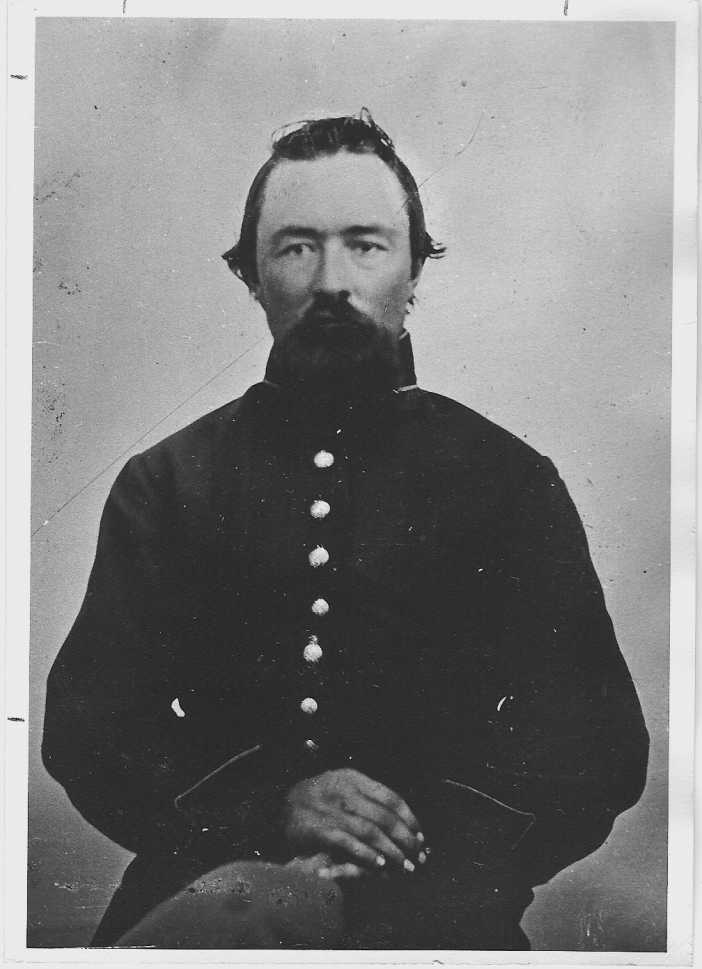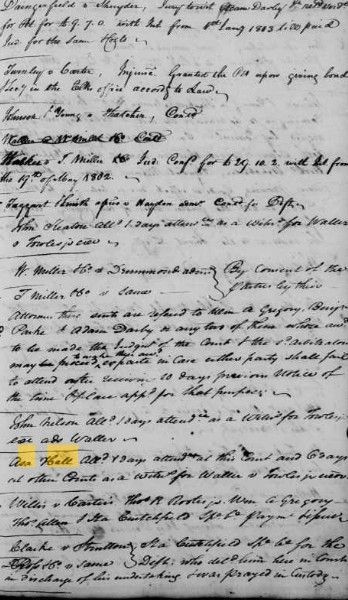Be Careful of Assumptions in Genealogy
Or How I Learned the Hard Way!
Often in our pursuit of our ancestry, we encounter situations that do not seem plausible. We see our ancestor as pursuing the life we imagine for him or her by growing up, marrying in their teens or early twenties, and then settling down to fruitful lives in a community. We place their names on a pedigree chart with their dates of birth, marriage, and death, and convention tells us we should then look to find their parents so we can do the same for them.
Sometimes, however, our ancestors do NOT conform to the patterns we have established for them in our minds. Sometimes they live their lives their own way – on their own terms. Finding the truth about these ancestors often lies at the heart of solving our genealogical brick walls and shattering our myths about the past.
Tracing my maternal Hall line back several generations was not difficult. My grandfather told me about his great-grandfather William Carroll Hall who came to Pope County, Illinois on the even of the Civil War. My grandfather had an old tintype of his wife Mollie Duvall (see an earlier blog about this fascinating lady). He told me that his brother who resided in Michigan had been given the picture of William Carroll they had in his military uniform. (the one attached here).
The story was related by descendants that William Carroll had left Tennessee to escape the war because he had not wanted to fight against his relatives. I found that he did wind up enlisting in Company A of the 120th Illinois infantry in August 1862. Some descendants indicated his family in Tennessee was displeased with this action on his part.
I quickly located the family in the 1870, 1880, and 1900 census records in which William Carroll was listed as 40, 50, and 70 years old respectively. Research at the Pope County courthouse led me to information on his land purchases in the county. Interviews with other relatives gave me oral traditions that I could research about the Duvall family but no one seemed to know anything about William Carroll’s parents. My grandfather told me that he had a faint recollection of hearing the name Matilda Hall but he had no idea if or how she was related to the family.
William Carroll’s death record indicates he died on 9 October 1908 and was 78 years and 6 days old at his death. This calculated to a birth date of 3 October 1829. All seemed to be in harmony.
All census records indicated he was born in Tennessee. Furthermore, William Carroll Hall’s Civil War discharge record indicated a birthplace of Smith County, Tennessee. In the pre-Internet age, we did not have immediate access to census records so I relied on Byron Sistler’s published census indexes of Tennessee. Reading line by line, I came across the following interesting entry.
HALL, Claiborne, 61, VA; Elizabeth, 60 VA; William 17 TN; John 14 TN; Susan 33 TN; Usibius 12 TN; Sarah 10 TN; Martha 7 TN. They are listed in exactly this order. As Dolly (rather than Mollie) was also found living with her father in Smith County in 1850, I concluded this had to be my William Carroll and he appeared to be the son of Claiborne Hall. Conventional research in existing published and unpublished record sources led me to find Claiborne Hall had married Elizabeth Herod, daughter of Revolutionary War soldier William Herod of Smith County.
I followed the family through to the 1860 census and located William with wife Dolly and two children living next door to Claiborne and Elizabeth Hall in Smith County. Aha! Further evidence of his parentage, I concluded. On a trip to the Tennessee State Library and Archives in Nashville, I located information about a partition suit instituted by the heirs after Claiborne Hall’s death in 1874. There was no son named William listed but I concluded that was probably because he had disinherited his son for fighting for the Union Army in Illinois.
About this time, the local Pope County Historical Society was publishing a book on the county’s families and I submitted an article about the Halls listing William Carroll as the son of Claiborne Hall and Elizabeth Herod.
In my genealogical naivete, I felt this was the right answer but boy, was I wrong! I could not reconcile in my mind how William could be left out of his father’s estate so easily. The 1850 census entry for Claiborne Hall looked to me like William, John, and Susan were probably children of Claiborne and Usibius, Sarah, and Martha must have been Susan’s children. But who was Susan? She was mentioned in the estate of Claiborne Hall as an heir. Not only that, why was John not listed in the estate? I found out he had died during the Civil War in a northern prison camp while serving as a Confederate soldier. I found that Usibius Hall was actually Eusibius P. Hall and he served in the same Illinois Union company as William Carroll during the Civil War. Seemed odd to me – things were now not adding up! (Red flags!)
And who was the Matilda Hall my grandfather had heard of? My great aunt who had lived in William Carroll’s daughter Sarah Ellen Hall’s house after her marriage in 1931 indicated Sarah Ellen had a letter address to a Matilda Hall – of course, the letter did not survive, but the fact it existed at one time proved there was a Matilda Hall.
All of these inconsistencies began to creep into my thinking and analysis and I thought maybe I was wrong. It all began to fall into place in 1989 when I made a trip to the Carthage Public Library in Smith County, Tennessee. One afternoon, I ran into the county historian, Mr. Carmack Key. He asked me who I was researching and when I replied Claiborne Hall, he began to tell me off the top of his head what he knew about the family. He told me exactly where Claiborne Hall lived (so I went and found what is still known as Hall’s Hill). He also talked about Claiborne’s children – all of whom matched the names found in Claiborne’s estate. When he talked of Susan Hall, though, he made one comment that hit me upside the head! He said Susan had five children and never married. Five? I could account for three from the 1850 census. But he said there were five! And he insisted it was true!
I decided then and there that I had better research Susan Hall a little more. She was in the 1860 census with her daughter Martha who had just married William N. Gregory. Following the Gregorys through to the 1870 census, I hit pay dirt! Rather than the name Susan Hall, I now found a Matilda Hall, age 50, living with them in Randolph County, Arkansas. There, at last, was the name Matilda! And the census gave the place of birth of some of the children of the Gregory’s as Illinois in the 1860s. Could it be that Susan and Matilda were one and the same and that she had even lived in Illinois at one point? Later on, I found a receipt in the record books of Smith County in which Susan Hall of Randolph County, Arkansas signed her name to get what was due her from the estate of “Claiborne Hall, who was my father.”
Now I knew that Susan Hall had to be the same person as Matilda Hall and that she was likely the mother of William Carroll as well as John Hall, in addition to the other three children! This was later confirmed when I located a descendant who had the trunk of William Carroll Hall. Among the many treasures inside was a fragmented portion of a letter signed by Susan Hall and addressed to William Hall. Most of the writing has been torn away but you can clearly read the words “A fine son!”
So there at last was the answer! I now know that Susan Matilda Hall was William Carroll Hall’s mother and Claiborne Hall and Elizabeth Herod were his grandparents. She had five children and never married. The receipt I mentioned dated 8 January 1880 is the last reference I have found to her. Oddly enough, she was not found in the 1880 census. As William Carroll’s wife Mollie Duvall died on 7 February 1880, I have wondered if she perhaps came up to Illinois to help care for the young children left without a mother. This would explain how a letter addressed to her found its way into her granddaughter’s things in the 1930s. Did she remain in Pope County and die there? (No death record found, but those are incomplete). Is she buried in an unmarked grave with the other family at Mount Olive Cemetery near Renshaw in Pope County?
I may never find the answers to those questions but DNA may one day help me to reveal who William Carroll’s father was. I have a few clues to work with on this. What is fascinating is that there was a young man in the neighborhood in the late 1830s where Susan Matilda lived in Smith County named Eusibius Payne. Did she name her son Eusibius P. Hall, born ca. 1838, after his father? If so, that tells me a lot about the spunkiness of Susan Matilda Hall!
I should have known that unless there was a will, a child is not disinherited. But I was naive and didn't think that through well. I should have been suspicious all along as there were red flags here and there.
So I learned the hard way – do thorough and exhaustive research. Watch out for assumptions. People did not live their lives in patterns we lay out for them.
Unfortunately, once something is in print, it is hard to undo. To this day, I am sad to say that researchers find my article, accept it as gospel, and put William Carroll’s incorrect parentage on Ancestry.com and other sites. (Another reason I always preach – do your own research with the original sources! Mistakes occur – assumptions can be wrong!).
Genealogical research is always evolving and we must be open to the possibilities that we are wrong. New clues can always come forward and change our conclusions. Be ready for it!
I hope this story is useful in getting you to challenge assumptions you have made in your research. I know it certainly taught me a lot!





